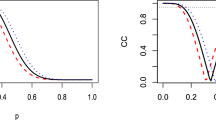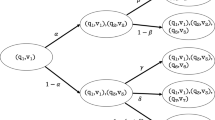Abstract
Following the pioneer work of Bruno De Finetti [12], conditional probability spaces (allowing for conditioning with events of measure zero) have been studied since (at least) the 1950's. Perhaps the most salient axiomatizations are Karl Popper's in [31], and Alfred Renyi's in [33]. Nonstandard probability spaces [34] are a well know alternative to this approach. Vann McGee proposed in [30] a result relating both approaches by showing that the standard values of infinitesimal probability functions are representable as Popper functions, and that every Popper function is representable in terms of the standard real values of some infinitesimal measure.
Our main goal in this article is to study the constraints on (qualitative and probabilistic) change imposed by an extended version of McGee's result. We focus on an extension capable of allowing for iterated changes of view. Such extension, we argue, seems to be needed in almost all considered applications. Since most of the available axiomatizations stipulate (definitionally) important constraints on iterated change, we propose a non-question-begging framework, Iterative Probability Systems (IPS) and we show that every Popper function can be regarded as a Bayesian IPS. A generalized version of McGee's result is then proved and several of its consequences considered. In particular we note that our proof requires the imposition of Cumulativity, i.e. the principle that a proposition that is accepted at any stage of an iterative process of acceptance will continue to be accepted at any later stage. The plausibility and range of applicability of Cumulativity is then studied. In particular we appeal to a method for defining belief from conditional probability (first proposed in [42] and then slightly modified in [6] and [3]) in order to characterize the notion of qualitative change induced by Cumulative models of probability kinematics. The resulting cumulative notion is then compared with existing axiomatizations of belief change and probabilistic supposition. We also consider applications in the probabilistic accounts of conditionals [1] and [30].
Similar content being viewed by others
REFERENCES
Adams, E. W.: The Logic of Conditionals, D. Reidel Publishing Co., Dordrecht, 1975.
Arló-Costa, H.: Belief revision conditionals: Basic iterated systems, Annals of Pure and Applied Logic 96 (1999), 3–28.
Arló-Costa, H.: Qualitative and probabilistic models of full belief, in: S. Buss, P. Hájek, and P. Pudlák (eds), Proceedings of Logic Colloquim'98, Association of Symbolic Logic and A. K. Peters, 1999, pp. 25–43.
Arló-Costa, H.: Bayesian epistemology and conditionals: The role of the exportimport laws, Unpublished manuscript, Philosophy Department, Carnegie Mellon University, 2000.
Arló-Costa, H.: Hypothetical revision and matter-of-fact supposition, in: Eighth International Workshop on Non-Monotonic Reasoning (NMR'2000), Special Session, Belief Change, Theory and Practice, 2000, Computer Research Repository, Los Alamos e-Print Archive, ACM and NCSTRL, forthcoming in Journal of Applied Non-Classical Logic.
Arlo-Costa, H. and Parikh, R.: Two place probabilities, full belief and belief revision, in: P. Dekker (ed.), Proceedings of the Twelfth Amsterdam Colloquium, ILLC/Department of Philosophy, University of Amsterdam, Amsterdam, 1999, pp. 1–6.
Balckwell, D. and Dubins, L.: On the existence and non-existence of proper, regular, conditional distributions, The Annals of Probability 3 (1975), 441–752.
Blume, L., Brandenburger, A. and Dekel, E.: Lexicographic probabilities and choice under uncertainty, Econometrica 59(1) (1991), 61–79.
Bratman, M.: Intentions, Plans and Practical Reason, Harvard Univ. Press, 1987.
Collins, J.: Belief revision, Ph.D. Dissertation, Princeton University, 1991.
Darwiche, A. and Pearl, J.: On the logic of iterated belief revision, Artificial Intelligence 89(1/2) (1997), 1–31.
De Finetti, B.: Les probabilités nulles, Bulletins des Sceinces Mathématiques (premiere partie) 60 (1936), 275–288.
Edgington, D.: On conditionals, Mind 104(413) (1995), 235–329.
Friedman, N. and Halpern, J. Y.: Belief revision: A critique, in: L. Carlucci Aiello, J. Doyle and S. Shapiro (eds), KR'96: Principles of Knowledge Representation and Reasoning, Morgan Kaufmann, San Francisco, CA, 1996, pp. 421–431.
Gärdenfors, P.: Knowledge in Flux, MIT Press, Cambridge, MA, 1988.
Goldszmidt, M. and Pearl, J.: Qualitative probabilities for default reasoning, belief revision, and causal modeling, Artificial Intelligence 84(1–2) (1996), 57–112.
Grove, A.: Two modelings for theory change, Journal of Philosophical Logic 17 (1988), 157–170.
Hájek, A. and Harper, W.: Full belief and probability: Comments on van Fraassen, Dialogue 36 (1996).
Hammond, P. J.: Elementary non-Archimedean representations of probability for decision theory and games, in: Humphreys (ed.), Patrick Suppes: Scientific Philosopher, Vol. 1, Kluwer, Dordrecht, 1994.
Halpern, J.: Lexicographic probability, conditional probability and nonstandrad probability, Manuscript, Cornell University, 14 November 2000.
Harper, W. L.: Rational belief change, Popper functions and the counterfactuals, Synthése 30 (1975), 221–262.
Jeffrey, R. C.: Matter of fact conditionals, Aristotelian Society, Supplementary Series 65 (1991), 161–183.
Joyce, J. M.: The Foundations of Causal Decision Theory, Cambridge Univ. Press, Cambridge, England, 1999.
Kyburg, H. E., Jr.: Probability and the Logic of Rational Belief, Wesleyan Univ. Press, Middletown, CT, 1961.
Lehmann, D. and Magidor, M.: What does a conditional base entails? Technical Report TR 90-10 of the Dept. of Computer Science, Hebrew University of Jerusalem, June 1990, later published in Artificial Intelligence 55, 1–60.
Levi, I.: The Fixation of Belief and Its Undoing: Changing Beliefs through Inquiry. Cambridge Univ. Press, Cambridge, England, 1991.
Levi, I.: For the Sake of Argument: Ramsey Test Conditionals, Inductive Inference, and Nonmonotonic Reasoning, Cambridge Univ. Press, Cambridge, England, 1996.
Lewis, D. K.: Probabilities of conditionals and conditional probabilities, The Philosophical Review 85 (1975), 297–315.
McGee, V.: A counterexample to modus ponens, Journal of Philosophy 82 (1985), 462–471.
McGee, V.: Learning the impossible, in: E. Eells and B. Skyrms (eds), Probability and Conditionals: Belief Revision and Rational Decision, Cambridge Univ. Press, Cambridge, England, 1994, pp. 179–199.
Popper, K. R.: The Logic of Scientific Discovery, Hutchinson, London, revised edn, 1968.
Ramsey, F. P.: General propositions and causality, in: R. B. Braithwaite (ed.), The Foundations of Mathematics: Collected Papers of Frank P. Ramsey, Routledge and Kegan Paul, London, 1931, pp. 237–255.
Renyi, A.: Foundations of Probability, Holden Day, 1970.
Robinson, A.: Non-standard Analysis, revised edn, Princeton Univ. Press, Princeton, 1996.
Seidenfeld, T., Schervish, M. and Kadane J.: Improper regular conditional distributions, Manuscript CMU, 4 October 2000.
Skyrms, B.: Updating, supposing and MAXENT, Theory and Decision 22 (1987), 225–226.
Spohn, W.: The representation of Popper measures, Topol. 5 (1986), 69–74.
Spohn, W.: A general non-probabilistic theory of inductive inference, W. Harper and B. Skyrms (eds), Causation in Decision, Belief Change and Statistics, Reidel, Dordrecht, 1988, pp. 105-134.
Stalnaker, R. C.: A theory of conditionals, in: N. Rescher, (ed.), Studies in Logical Theory, Basil Blackwell Publishers, Oxford, 1968, pp. 98–112.
van Fraassen, B. C.: Representation of conditional probabilities, Journal of Philosophical Logic 5(3) (1976), 417–430.
van Fraassen, B. C.: Erratum to [40], Journal of Philosophical Logic 6 (1977), 365.
van Fraassen, B. C.: Fine-grained opinion, probability, and the logic of full belief, Journal of Philosophical Logic 24(4) (1995), 349–377.
Rights and permissions
About this article
Cite this article
Arló-Costa, H., Thomason, R.H. Iterative Probability Kinematics. Journal of Philosophical Logic 30, 479–524 (2001). https://doi.org/10.1023/A:1012277218013
Issue Date:
DOI: https://doi.org/10.1023/A:1012277218013




